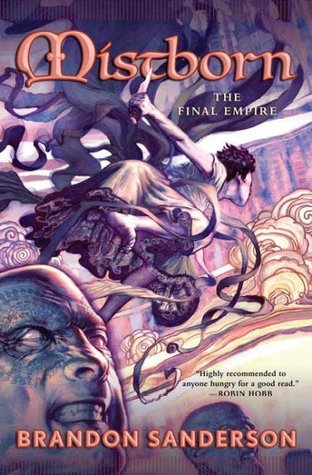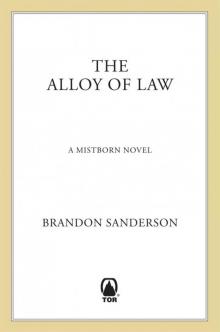- Home
- Brandon Sanderson
The Way of Kings Prime Page 13
The Way of Kings Prime Read online
Page 13
Nothing the women discussed seemed important. Perhaps Shinri had been away too long, and the people involved were too removed. Or maybe it was her weakened position in court—now that Jasnah was universally dismissed, Shinri was treated lightly by association. Yet she found herself unconcerned by her change in popularity. What did it matter to her if Eleventh Lord Senden was no longer courting Lady Rienan? Why should she care about the list of women who hadn’t been invited to the private ball at Lord Kavenden’s mansion?
Jasnah would chide her. These minor workings of the court were clues to much greater events. Lord Senden was heir to an independent title, and the woman who found his hand would gain much power from the union. Lord Kavenden was a Fourth Lord, controller of most of Alethkar’s non-imported Jasinite trade. The lords he snubbed gave good indication to his business plans. Jasnah often said that no courtly event—from marriages to friendly games of chips—could be safely ignored.
It just all suddenly seemed so frivolous to Shinri. She had hated Prallah, with its crom-overgrown villages and its empty landscape. The cities had been filled with the half-starved and the frightened, their men slaughtered in one of a tenset wars during the last half-century. She’d hated the fighting—the men groaning in pain, the wounded and the lame. Jasnah could step over a corpse with the same indifference she gave a pebble, but Shinri had frozen in terror the first time she’d seen one. She had never been to war before—and never wished to see its devastation again.
Compared to those memories, the idle chatter of women in a garden sipping tea seemed pointless. And what of Tethren. Is he frivolous? He had been so kind to her—loving, even, which was far more than she had been led to expect from a political marriage. But she hadn’t seen him much during the last year. Her impressions of the man, five years her senior, had come from the idealistic viewpoint of a young girl, more a child than a woman. Yet those memories were sweet. The promise of his hand had been a driving force behind her desire to change and become the courtly woman she had spurned during her youth.
And now you’ve started to change back, she realized. Just like Lady Tenet said. You’ve changed, Shinri, and perhaps not for the better. I thought you were over this. I thought you had decided to finally become a proper lady, just as your father always wished. And, for a time, she had done it. Unfortunately, the war had revived some old inclinations. Even still she felt its hand on her mind, its terrors weighing her down.
Shinri sighed, resisting the impulse to dump her tea dregs onto the clean white marble of her bench. As she sat, her mind reflexively half-focused on the conversation around her, Jasnah’s training teaching her to sift information even when she didn’t really care to.
“Lord Jezenrosh still hasn’t come to welcome the king home from his campaign,” one of the ladies noted. Parshen Jezenrosh was a favorite topic of conversation in court—if only because his early withdrawal from the war smelled of scandal.
“Indeed,” Lady Tenet said knowingly. “Though, of course, his illness is said to preclude travel—perhaps even the short distance it would take to travel from Crossguard to the First Capital.”
Lord Jezenrosh. Jasnah was suspicious of him as well—and this time, Shinri agreed with her. Jezenrosh had never seemed like a trustworthy man. Though he spoke rarely, the words that did leave his tongue were reprobative more often than not. His eyes were merely tolerant when they weren’t outright disapproving, and his attitude toward the war had been less than accommodating. When he’d left Prallah six months before, Shinri had been glad, though the rumors of his actions during the king’s absence implied it would have been much better for the throne had Jezenrosh remained where Elhokar—and more importantly Jasnah—could have kept better watch over him.
Shinri excused herself as the conversation turned toward less interesting topics. Jasnah had asked that Shinri attend any functions to which she was invited—apparently, Jasnah herself was invited to so few that she needed Shinri’s ears to go on her behalf. There was only so much, however, that one could endure. Shinri set her cup on the bench and left the sitting circle, walking through the monolithic, overgrown pillars toward the garden’s exit. Outside, her litter-bearers waited to return her to the palace, but she waved them away. Accustomed to their lady’s eccentricities, the men simply lifted their litter obediently, returning to the palace alone.
Shinri regarded the streets of Ral Eram. During the war, ‘streets’ had been made between tents and had been filled with soldiers; it was almost overwhelming to be in a place with proper buildings, markets, and streetgoers. She looked over her options, picked a direction, and began to walk.
The whim to walk the streets often took her. Once, as a child, she had scampered wildly, ignoring the propriety of her birth. Though she had long since overcome such silliness, she had learned that remaining in her rooms when she felt like walking would only make her nervous and irritable. Much better to be moving, strolling through the streets with new pathways opening around her, her slippered feet taking her where they willed.
Ral Eram was a beautiful city. Aged like a wise grandfather, the ancient streets and stone buildings were kept free from cromstone and refuse. Structures stood with broad columns and firm lines, following the architecture of Epoch Kingdom times. The city was busy as well; King Elhokar’s army was slowly traveling through the Oathgates and making its way down the ramps to the foot of the mountains, where it would gather for final accounting before dismissing the volunteer portions.
Merchants had gathered eagerly, knowing that the men would receive bonus pay now that the war was finished. Along with the merchants came families seeking to visit loved ones, and the regular stormleavings that aggregated around any large group of soldiers. Shinri strolled through streets both crowded and ignored, paying little attention to the people but enjoying the pathways they created.
Did the changes in herself bother her? Innocence, in its own way, was contentment. A life of balls and gossip did not bring images of death and injury. But she couldn’t ignore what she had seen. Like an Awakener’s crystal, the light of dissatisfaction had been roused within her, and she found herself dissatisfied with her new life. Could she really be satisfied with an existence whose purpose stretched no farther than looking pretty for the next feast, even if she were married to a man such as Tethren?
Jasnah had purpose. Conniving though the woman might be, Jasnah always found something to occupy her talents. She was ever working. What others saw as social occasions, Jasnah viewed as an avenue toward potential alliances. Jasnah’s was not the life Shinri would choose for herself, but at least it had meaning. Jasnah’s battle plans had driven Alethkar’s armies to victory, and her political abilities had solidified Elhokar’s place on the throne during the tempestuous years following their father’s death. Shinri had little doubt that if Jezenrosh was planning to overthrow the king, Jasnah would discover and foil his schemes.
What could Shinri find for herself that was similarly fulfilling? She paused, realizing that she had found her way to the front of the city. The city gates were open, and the massive walls of Ral Eram—Awakened from stone to dark steel during the Epoch Kingdom days—stood as if pouting at their ineffectiveness as hundreds of people streamed in and out of the city. Through the gates, Shinri could see the landscape beyond. Ral Eram huddled on a short plateau abutting the mountainside itself, and the view beyond the walls was expansive.
Empty plains and foothills expanded before her. The wilderness below was a place without roads. Or, Shinri thought, a place with nothing but roads. Each way you travel is a new path, each direction a new choice. She was struck by a sudden desire to flee the city, to leave its women to their gossips both clever and frivolous. She wanted to pull the hairsticks free from her braids, cast off the binding cloth of her talla, and see a place far away. What would the noblemen merchants below think, to see Shinri run wildly past, bursting free of those city walls? It would breach their perfection, having one of their own abandon decorum in such a way. The
thought was enough to make her smile.
It was, of course, insane. She couldn’t survive alone—the hills outside Ral Eram were stormlands, and Shinri wouldn’t even have the beginnings of an inkling how to gather food or care for herself. She was a product of noble society; she knew how to consume resources and spit out intrigue as a byproduct. The impulse to leave was lunacy.
Perhaps this is how that poor madman felt, Shinri thought, on that day—whenever it was—when he finally gave himself up to insanity.
Shinri shook her head, stooping down to gather some pebbles from a crack near a stone wall. Stuffing the chips of stone in her sleeve pocket, she turned her feet toward another path, wandering in the general direction of the palace. As she walked, she began to hum to herself. It had been a time since she sang the songs of her childhood, but—as always—the tunes came back without effort. However, as always, the words themselves were lost to her. She contented herself to the humming as she walked.
Her emotions would recenter. She hadn’t really been back for very long—she just had to give herself more time. The old inclinations would fade, and she would find pleasure in courtly life again. She could tell herself this with confidence, for the great stabilizing factor was returning. Tethren. When she saw his proud, noble face again—when he smiled at her as he had before, this time seeing her as a woman and not a child—then things would return to the way they had been before.
She eventually approached the ramp up to the palace. Here, her pathway options narrowed drastically. The palace was built on a smaller plateau a short distance above the city, and the only way up to it was via a pair of stone ramps—one on each side of the palace. Shinri trailed up the eastern one. The stones were slick and clean, the blood that had been spilled on both ramps long ago had since been washed away by the raging of countless highstorms. Though the Aleth claimed prevention as their reason for conquering the First Capital some fifteen years before, the rest of Roshar had a less-idyllic view of the ‘liberation’ of Ral Eram. Alethkar made a hefty profit off of traffic through the Oathgates. Though the nation now spoke of honor and defending against tyranny, pointing out its resistance of the Tyrant Jarnah, there were scars in its past that did not bear up beneath heavy scrutiny.
The palace complex was enormous, built to hold the courts of ten Epoch Kings, not just one. As a child barely past her Charan, the youthful Shinri had gotten lost in its plush corridors on tensets of occasions. Even still, she only wandered the far wings when she knew she had a great deal of time to find her way back. Time she did not have this day. As tempting as those untraveled pathways were, she turned her attention toward locating Lady Jasnah. Her mistress would wish to know of the day’s events, especially Lady Tenent’s suggestion that Shinri transfer her wardship to another noblewoman.
Lines of striped carpet pointed her down the center of the corridors, so Shinri stayed to the peripheries, making her way through the Aleth wing of the palace. Lady Jasnah’s rooms did not reflect her recent loss in prestige; they were among the most lavish and well-placed in all of the palace. Of course, the king’s sister could hardly be located anywhere else. Lady Jasnah was in her study, her guards standing by the walls, minor female attendants chatting quietly at a table a short distance away. The Lady Kholin herself sat at a round table set near the center of the room, sorting through stacks of papers. She glanced up when Shinri entered, then immediately turned her attention back to her research.
Shinri walked forward and seated herself on a stool at Jasnah’s table. The room was stuffily well-appointed, like most in the palace. The floor rug was monochrome blue, and was so clean that Shinri didn’t doubt that the palace staff had crawled across it picking each and every bit of dirt from its follicles, just so it would be perfect for Lady Jasnah’s return. The walls were well lit, and Shinri found it strange that she should wish them to be tent canvas instead of stone.
“What is that you’re humming?” Jasnah asked, not looking up from her notes.
Shinri paused, realizing that she had still been quietly singing. She flushed. “Nothing, my lady,” she said. “Just another song from my childhood.”
“Your singing made quite a stir at the feast,” Jasnah noted. “Now that we’ve returned to civilization, perhaps it is time to resume your lessons. Talents unused quickly become detriments when everyone realizes that your current skill fails to agree with your reputation.”
So like Jasnah, Shiri thought. Concerned for the utilitarian use of the talent; completely unmindful of its beauty.
“Well?” Jasnah asked, not looking up from her notes. “How was tea?”
“It went mostly as expected,” Shinri said, idly removing the handful of pebbles from her left sleeve pocket. “Though Lady Tenet did something odd. She cornered me and suggested that I switch my wardship to another lady.”
Jasnah nodded, taking the news in with her customary calmness. “I expected that would come today,” she noted. “It was only a matter of time.”
Shinri started. “You knew what they would do?” she asked. “Why didn’t you warn me?”
“You had to be free to make your own decision when the offer came,” Jasnah said. “I presume, since you are telling me what happened, that you have decided to reject the proposal.”
Shinri felt a chill. You taught me too well, Jasnah. I see what you are doing. You were testing me. That’s why you didn’t tell me—you wanted to see what I would do. By the Bondkeeper! Can’t you let yourself trust anyone?
Jasnah picked through her papers as if ignorant, or uncaring, of Shinri’s realization.
I defended you today, Shinri thought. She forced herself to remain calm, and waved for an attendant to bring her some tea. Nice, mild, feminine tea. Shinri took a sip, then idly rolled the pebbles in her hand, occasionally letting one drop to the carpet below.
Jasnah shook her head. “I need something more than this,” she mumbled, waving her hand over the sheets of paper. “I need to see the royal ledgers themselves. I won’t know what that woman’s up to until I can read first-hand what she has been spending my brother’s money on. And would you stop that?” she said, referring to Shinri’s pebbles. “I can’t believe you’ve started dropping rocks on the floor again. I thought you had gotten over that years ago.”
“I’m sorry, my lady,” Shinri said, putting the pebbles back in her sleeve pocket.
“I need you alert, Shinri,” Jasnah said. “Something is happening here in the palace, more than Nanavah would wish us to know. They went after you because you are the last ally I have. Stealing my ward from me would be a master stroke, a final proof that I have been defeated. Lady Tenet is little more than the queen’s errandwoman now—Nanavah was behind the suggestion that you reassign your wardship, I promise you that. And, since the queen saw fit to try turning you, it means she still feels threatened by me. That means she’s hiding something.” Jasnah clenched her jaw in thought. “I need to see those ledgers.”
“Nanavah is technically the First Scribe,” Shinri said. “And it appears that the king has begun enforcing her position. You’d need her permission to access the royal ledgers.”
Jasnah’s mouth thinned. “Perhaps,” she said, thinking for a moment. Then she turned back to her papers. “Here,” she said, selecting a sealed letter from the stack. “This came for you a short time ago.”
Shinri recognized the glyph on the front immediately—a stylized nen in the form of a flower, the symbol used by Tethren’s sister. She was the one he usually used as a scribe. Shinri sighed in relief, accepting the letter from Jasnah with an eager hand—the blatant emotion earning her a small frown of displeasure. For the moment, Shinri didn’t care. Tethren had finally written her. Everything would be all right. Within his smile, she could rejoin the perfection of the court, perhaps banish the worries of her childhood.
She broke the seal, and read the letter. Then she read it again. She was too stunned to try for a third.
“Everything well with Prince Tethren?” Jasnah aske
d distractedly. “I told you it would be.”
“Everything is . . . pleasant, my lady,” Shinri said quietly. “Very pleasant.”
A few seconds later the letter floated lazily to the floor, then a handful of brown pebbles dropped on top of it, scattering brown cromdust across its surface. Neither pebbles nor dust did much to obscure the words, however; words which proclaimed Prince Tethren Rienar’s ship sunk during a summer highstorm, all hands lost.
chapter 12
Merin 3
Merin stood uncomfortably, trying not to blush in embarrassment as the tailor pulled out yet another seasilk cloth—this one red—and draped it over Merin’s shoulders. The thick-mustached man turned, eyebrows upraised questioningly.
Aredor tapped his cheek musingly. The room was well-lit and crafted of typical Kholinar granite, with woven mats on the floor and decorative pillars along the walls. Aredor leaned against one of the room’s pillars, watching the tailor work.
“Well, ladies?” Aredor asked, turning to the six young women who sat, arrayed in bright-colored tallahs and jewel-riddled hairbuns, to his side.
“Better,” one of the women said. Merin still struggled to remember all of their names—he thought her name was Irinah. A creature with dark hair and a plump face, she was the daughter of one of Lord Dalenar’s trusted Shardbearers.
“I agree,” said the one with light hair and a greenish dress. Rahnel, he thought. “But he doesn’t look good in colors that bright. Try something darker, master tailor.”
The other women agreed, nodding and chatting among themselves. Merin flushed at the attention as the tailor removed the cloth and waved at his aides to bring him some other choices. It seemed ridiculous to Merin that people could spend so much time worrying about clothing. Before the colors, Merin had spent the better part of an hour trying on different cuts of shirts and trousers behind the changing screen, then presenting each new combination for Aredor and the women to judge.

 Steelheart
Steelheart The Rithmatist
The Rithmatist Mistborn: The Final Empire
Mistborn: The Final Empire Oathbringer
Oathbringer The Way of Kings
The Way of Kings Redemption
Redemption Skin Deep
Skin Deep Elantris
Elantris Snapshot
Snapshot Sixth of the Dusk (Cosmere)
Sixth of the Dusk (Cosmere) Mistborn: Secret History
Mistborn: Secret History White Sand, Volume 1
White Sand, Volume 1 Legion
Legion The Well of Ascension
The Well of Ascension The Bands of Mourning
The Bands of Mourning Words of Radiance
Words of Radiance The Hero of Ages
The Hero of Ages Calamity
Calamity Alcatraz Versus the Scrivener's Bones
Alcatraz Versus the Scrivener's Bones The Alloy of Law
The Alloy of Law The Emperors Soul
The Emperors Soul The Dark Talent
The Dark Talent The Gathering Storm
The Gathering Storm Alcatraz Versus the Shattered Lens
Alcatraz Versus the Shattered Lens Mitosis
Mitosis Alcatraz vs. The Evil Librarians
Alcatraz vs. The Evil Librarians Rhythm of War (9781429952040)
Rhythm of War (9781429952040) Alcatraz Versus the Knights of Crystallia
Alcatraz Versus the Knights of Crystallia Warbreaker
Warbreaker Firstborn
Firstborn Starsight
Starsight Edgedancer
Edgedancer Perfect State
Perfect State Shadows of Self
Shadows of Self The Way of Kings Prime
The Way of Kings Prime Starsight (US)
Starsight (US) Shadows for Silence in the Forests of Hell
Shadows for Silence in the Forests of Hell Arcanum Unbounded: The Cosmere Collection
Arcanum Unbounded: The Cosmere Collection Awakening
Awakening Firefight
Firefight Dawnshard
Dawnshard Defending Elysium
Defending Elysium White Sand
White Sand Infinity Blade: Redemption
Infinity Blade: Redemption The Final Empire
The Final Empire Skyward
Skyward Lies of the Beholder
Lies of the Beholder Elantris e-1
Elantris e-1 Steelheart r-1
Steelheart r-1 Legion: Skin Deep
Legion: Skin Deep Well of Ascension
Well of Ascension Mistborn
Mistborn Alcatraz versus the Evil Librarians
Alcatraz versus the Evil Librarians The Final Empire m-1
The Final Empire m-1 The Way of Kings (Stormlight Archive, The)
The Way of Kings (Stormlight Archive, The) Calamity (The Reckoners)
Calamity (The Reckoners) Legion and the Emperor's Soul
Legion and the Emperor's Soul Legion: The Many Lives of Stephen Leeds
Legion: The Many Lives of Stephen Leeds The Mistborn Trilogy
The Mistborn Trilogy Bands of Mourning
Bands of Mourning Alcatraz
Alcatraz The Hero of Ages m-3
The Hero of Ages m-3 Alcatraz vs. the Shattered Lens
Alcatraz vs. the Shattered Lens The Alloy of Law: A Mistborn Novel
The Alloy of Law: A Mistborn Novel The Way of Kings sa-1
The Way of Kings sa-1 Infinity Blade: Awakening
Infinity Blade: Awakening Sixth of the Dusk
Sixth of the Dusk The Stormlight Archive
The Stormlight Archive The Aether of Night
The Aether of Night